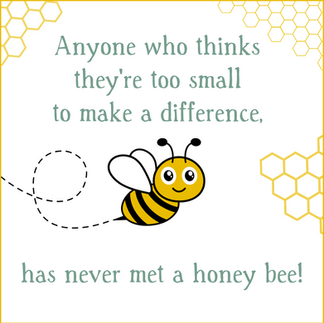Bees are nature’s magicians so let’s create a bee friendly garden
- Hidden Gardens of Grayshott

- Mar 24, 2023
- 2 min read

We're delighted to announce that Brad is back for our 2023 event! Our very own local bee keeper will be one of the attractions at the Hidden Gardens event on 28th and 29th May, where he will impart his wealth of knowledge on the importance of bees to our local environment.
Last May one of our volunteers had the pleasure of spending time with Brad to learn the art of bee keeping. She was amazed to hear that St Anne’s, one of our hidden gardens, has 5 hives with each hive holding 60,000 bees so a total of 300,000 bees in just one location!
Brad explained that there are 3 types of bees in each hive - drones, workers and the queen.
Our volunteer, Jane was curious to hear how the hive selects a queen once the original queen has swarmed or died

Bees tend to select 40 Queens at a time, choosing eggs and then feeding them with rich larvae food.
The first to hatch will try to kill all the unhatched queens in their cocoons, using their stingers. If one manages to hatch before being killed, they fight until one becomes the “Alpha Queen”, or if there are sufficient workers, then cast swarms are produced. It was interesting to learn that Honey bees are not endangered, as are some Solitary and Bumble Bees, and surprisingly they don’t hibernate remaining active during the winter from 7degC onwards. Thick or thin honey will be determined by what is nearby and its flavour will depend on where the bees collect the nectar.
So, why is this winged insect so important to human life? These small social creatures are valuable for their pollination services, vital for ecological balance and making food production possible. We can all make a difference in our gardens with a few simple steps:
Encourage foraging by providing simple open flowers. Beautiful hybrid flowers with layers of petals are either infertile or bees find it difficult to get to the pollen.
Made popular again by Netflix’s Bridgerton series, Wisteria a beautiful flowering climbing plant, is full of perfect blooms and loved by bees.
Plant fruit trees such as plum, apple & cherry trees which are full of spring time blossoms.
Grayshott is known for its beautiful rhododendrons, however some are poisonous to bees so choose with care
Ideally have all year-round flowering so select plants that flower early and into the autumn
Watch out for Bee friendly plants labelling
Instead of erecting fencing, perhaps consider planting flowering hedges to encourage bees and other wildlife
When tidying up the garden always check hollow stems to make sure there are no bees hidden inside, ideally setup a bug hotel in the garden
Brad will be at St Anne’s Garden over the event weekend, so make sure to make a “bee line” to his display! In support of the bees watch out for our Shop Owners Window Display competition, where each window will be creating a “buzz” a few weeks before the event.











Comments